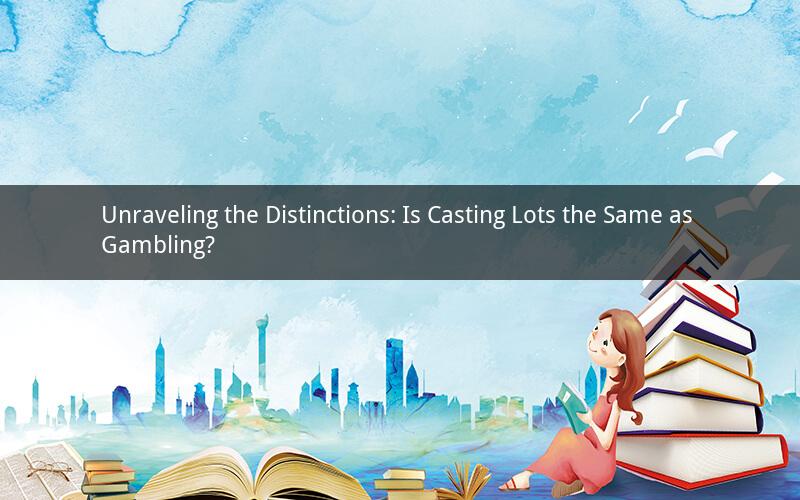
Casting lots and gambling might seem like two identical concepts at first glance, but upon closer examination, there are significant differences that set them apart. This article delves into the origins, purposes, and practices of both activities to provide a clearer understanding of their distinctions.
I. Origins of Casting Lots
Casting lots, also known as divination or drawing straws, has been practiced for thousands of years across various cultures. Its roots can be traced back to ancient civilizations such as the Sumerians, Egyptians, and Greeks. The practice was often used to make decisions, determine fates, or settle disputes.
II. Purposes of Casting Lots
The primary purpose of casting lots was to seek guidance or make informed decisions. In many cultures, it was considered a divine intervention, with the outcome being interpreted as a sign from the gods. Some common uses of casting lots include:
1. Determining fates: Casting lots was used to determine the fate of individuals, such as whether they would go to war or embark on a journey.
2. Making decisions: In legal disputes, casting lots could be used to determine the guilt or innocence of a party.
3. Choosing leaders: In some cases, casting lots was used to select leaders or representatives within a community.
III. Practices of Casting Lots
Casting lots involved drawing or throwing objects, such as sticks, stones, or dice, to determine the outcome. The objects were typically marked with symbols or numbers to represent different possibilities. The process was considered to be a random act, with the outcome being left to chance.
IV. Origins of Gambling
Gambling, on the other hand, has its roots in ancient China and Egypt. It evolved into a widespread form of entertainment and social activity, with various forms and variations emerging over time. Unlike casting lots, gambling primarily involves the pursuit of wealth and entertainment.
V. Purposes of Gambling
The primary purpose of gambling is to win money or other valuable items. While entertainment and socialization can be secondary motives, the pursuit of wealth remains the driving force behind most gambling activities. Some common types of gambling include:
1. Casino games: Games like poker, blackjack, and slot machines are popular forms of gambling that are played in casinos.
2. Sports betting: Betting on the outcome of sports events, such as football, basketball, or horse racing, is a widespread form of gambling.
3. Lottery: Purchasing lottery tickets in the hope of winning a large sum of money is another common form of gambling.
VI. Practices of Gambling
Gambling involves placing bets on an outcome with uncertain results. The bets can be placed on various events, such as the result of a sports game or the roll of a dice. The process is typically governed by rules and regulations, and the outcome is determined by chance.
VII. The Distinctions Between Casting Lots and Gambling
Now that we have explored the origins, purposes, and practices of both casting lots and gambling, let's examine the key distinctions between the two:
1. Purpose: Casting lots was primarily used for seeking guidance or making informed decisions, while gambling is focused on winning money or other valuable items.
2. Origin: Casting lots has its roots in ancient civilizations, while gambling originated in ancient China and Egypt.
3. Practice: Casting lots involved drawing or throwing objects to determine the outcome, while gambling involves placing bets on uncertain events.
4. Interpretation: The outcome of casting lots was often interpreted as a sign from the gods, while the outcome of gambling is purely based on chance.
VIII. Conclusion
In conclusion, while casting lots and gambling may appear similar on the surface, they have distinct origins, purposes, and practices. Casting lots was primarily used for seeking guidance and making informed decisions, while gambling is focused on winning money and entertainment. Understanding the differences between these two activities can provide a clearer picture of their unique roles in history and culture.
Questions:
1. How did casting lots differ from other forms of divination in ancient civilizations?
2. Can casting lots be considered a form of entertainment?
3. What are some common practices of gambling in ancient civilizations?
4. How did the development of technology influence the evolution of gambling?
5. Are there any ethical concerns associated with both casting lots and gambling?